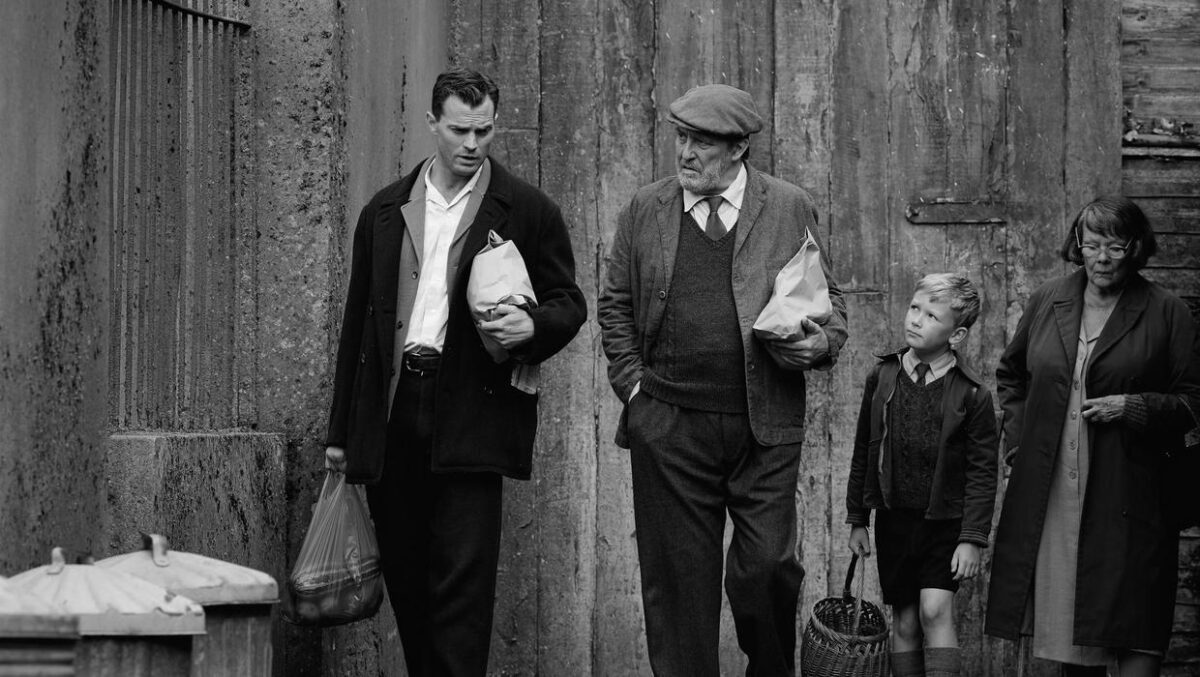This film review originally appeared on the Socialist Democracy website.
The marketing people at Universal Pictures must have shrieked when they were told to come up with an advertising campaign for Kenneth Branagh’s new film Belfast. It goes on general release in Ireland and Britain this week.
“Well guys, it’s about how a family was forced out of their home because they refused to join in a sectarian pogrom. The action takes place in a town on the north-west fringe of Europe where it rains all the time, people were really poor and spoke in a version of English that may require subtitles in America.”
That goes some way to explaining why the social media campaign resembles a trailer for a Motown jukebox musical with Jamie Dornan, Belfast’s best-spoken joiner, belting out Everlasting Love at a do after his father’s funeral.
The Branagh family lived in the Tiger’s Bay area of north Belfast. An online search for photos shows that today every inch of wall space is covered with murals depicting the loyalist drug and murder gangs which are a plague in working class Protestant parts of the north of Ireland. Early in the film we see a mob attack some of the properties in the Branagh street. If you didn’t hear a couple of shouts of “Catholics out” you wouldn’t know who the attackers were or why they’d launched their pogrom. It was August 15th, 1969.
William Branagh, Kenneth’s father, was working in England to pay off a tax bill and returned to the family every couple of weeks. The small, freezing cold terraced house with an outside toilet was typical of a lot of housing in the city then and the rather saccharine opening sequence gives a sense of the tightly knit community. It’s also the first hint that the accents were considerably softened for the cinema while retaining just enough of a twang to be acceptable to the unacquainted ear.
Personal tribute
Branagh senior refuses to join the un-named loyalist gang which is driving out Catholics. His motives are never made clear. Young Kenneth sees him as a Belfast Gary Cooper, standing up to the bad men alone. When he does express a view on the subject it’s a 2020s liberalism. Another possible explanation is that he was one of the “rotten Prods”, a class-conscious worker influenced by radical politics who stood up to loyalist sectarianism. They were often driven out of jobs in Belfast.

The film is ruined by its sentimentality. An irritating sub-plot involves eight-year-old Kenneth’s love for a girl in his class. He only discovers at the end that she’s actually a Catholic. Grove Primary may be non-denominational now, but it stretches belief that a Catholic child would have gone to a Protestant school in Tiger’s Bay at the time, though not nearly as much as the scene where the RUC try to stop the pogrom. The audience learns nothing about the Civil Rights movement, discrimination, loyalism or why the pogroms happened.
Don’t go to see it expecting to learn much about the history of Belfast. It is Branagh’s tribute to his father who faced down the gangs that became the Shankhill butchers and the UDA and to the women in his family who held them together.
Not all the Branaghs were so lucky. In 2001 Glen, a member of the UDA “youth wing” and a distant relative of Kenneth, blew himself up with a bomb he’d intended to throw during a riot. Kenneth and his brother owe their father a lot.
Art Book Review Books Campism Capitalism China Climate Emergency Conservative Government Conservative Party COVID-19 Creeping Fascism Economics EcoSocialism Elections Europe Event Video Far-Right Fascism Film Film Review Fourth International France Gaza History Imperialism Israel Italy Keir Starmer Labour Party Long Read Marxism Marxist Theory Migrants Palestine pandemic Police Protest Russia Solidarity Statement Trade Unionism Trans*Mission Ukraine United States of America War

